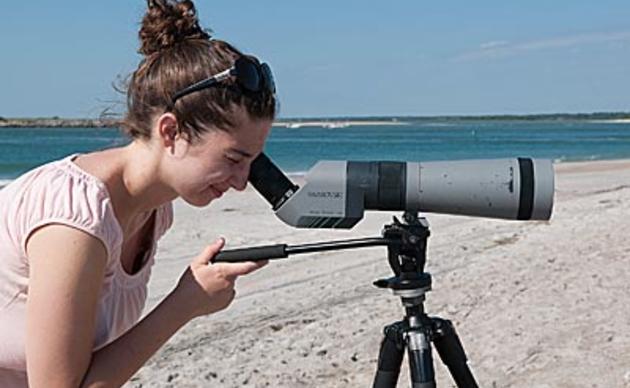Celebrating Beach Birds
Over 20 years ago, Audubon's vision for protection of North Carolina's coastal birds was to create a network of sanctuaries to protect the nesting sites of pelicans, egrets, ibis, terns and other shorebirds, and to use these sanctuaries as scientific laboratories to advance bird conservation. Today, Audubon protects 21 sanctuaries that are essential nesting sites for more than 50,000 birds. Our sanctuaries include North Carolina's most important nesting sites like Battery Island, the state's largest wading bird colony, and Beacon Island, a sanctuary that has been essential to the recovery of Brown Pelicans.
For everything that North Carolina's spectacular coastline offers for people, it offers just as much for birds. The state's undisturbed beaches and dynamic inlets are excellent habitat for nesting Black Skimmers, Least Terns and American Oystercatchers. The same beaches, inlets and inlet shoals are essential to migrating and wintering shorebirds, many of which nest as far away as the Arctic.
Yet, with each passing season, more habitats that North Carolina's birds require at critical times in their lives are being lost. Many of our coastal birds are already forced to eke out an existence in poor quality habitats where they suffer from chronic threats. As a result, Black Skimmers and Common Terns are declining, and some species of shorebirds have declined by as much as 80%. If the trend continues, the eventual crash in some coastal bird populations is inevitable.
At the Coast
- Be attentive to birds. If you see birds rising off the beach, they may be flying off of nests. Please move away from the area.
- Respect all signs at the beach. The signs are there to help reduce disturbance to birds. When birds are disturbed off their nests, their eggs and chicks are exposed to danger from extreme temperatures and predators lessening their chance of survival.
- Watch for “posted areas”. These are areas where a rope is strung between posts. Birds are sitting on nests in these areas, so please stay back. When parents fly off the nest, babies are exposed to the extreme heat and predators lessening their chance of survival.
- Birds need to rest and feed all year, and allowing them to do so undisturbed can make a big difference during a harsh winter or long migration. Avoid getting so close to birds that they use energy to fly away from you.
- Keep dogs on leashes. Where dogs are allowed on the beach, keep them on a leash and away from nesting areas, and feeding or resting flocks. Dogs look like birds' natural predators and cause stress and disturbance, even if they aren't actively chasing them.
- Avoid flying kites, throwing balls and exploding fireworks near nesting and feeding areas. These activities can cause birds to leave their nest leaving chicks unprotected.
- Do not feed gulls. This seemingly harmless activity can attract gulls to nesting areas. Gulls do prey on eggs and baby birds.
- Take trash with you when you leave the beach. Garbage, including bait and scraps from cleaned fish, attracts predators to nesting areas. Discarded fishing line can entangle and kill birds.
Ways You Can Help
When humans help shorebirds by sharing the beach, they are rewarded with the spectacle of wild birds including the opportunity to observe the drama that unfolds with every nesting season, every migration and every winter. Here are some simple steps you can take to help coastal birds.
- Sign up to receive e-bulletins about our varied coastal bird species and the habitats that are needed to protect them.
- Watch this video about our successful Beach Bird Stewards program.
- Donate to support the coastal program.
- Sign up for our action alerts to stay involved with important policy issues affecting North Carolina's coast.
How you can help, right now
Donate to Audubon
Help secure the future for birds at risk from climate change, habitat loss and other threats. Your support will power our science, education, advocacy and on-the-ground conservation efforts.
Sign Up For Our eNewsletter
Keep up-to-date on all that happens with Audubon North Carolina's research, events and volunteer opportunities.




